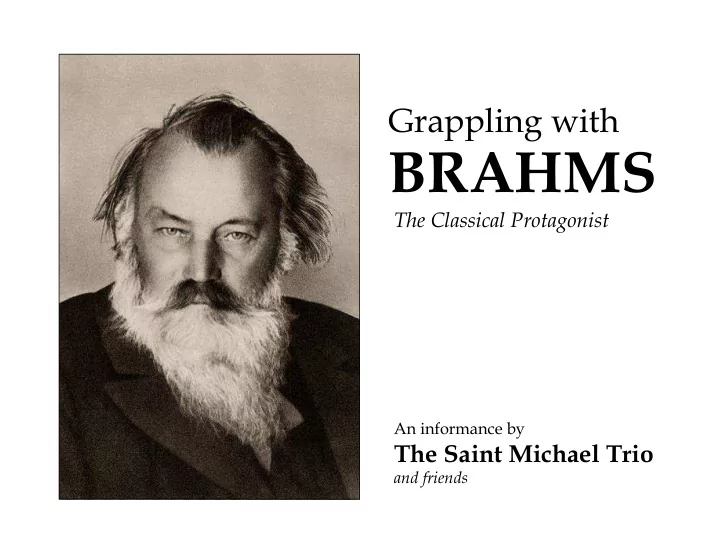

Grappling with BRAHMS The Classical Protagonist An informance by The Saint Michael Trio and friends
I find Brahms’ music is turgid and graceless . Igor Stravinsky I play through Brahms’ music every few years to remind myself how bad it is—and usually find it was worse than I remembered. Benjamin Bri3en
I played over the music of that scoundrel Brahms. Such a gi>less [rascal]! It annoys me that this self- iniCated mediocrity is hailed as a genius. Pyotr Tchaikovsky
Brahms is the composer par excellence who, free from any provincialism or naConal dialect, writes for the whole world and for all Cme. He is a giant, lo>y and unapproachable. Edward Elgar
The Three B’s
THREE WAYS TO THINK ABOUT THIS 1. There’s no accounCng for taste. 2. Brahms as a pessimist. 3. Brahms as a complex person who had a lot to say (and express).
Johannes Brahms 1833-1897
Hamburg
Hamburg shipyards
Hamburg docks
Johannes Brahms 1833-1897
Dusseldorf, 1870
The Schumann residence, Dusseldorf
Robert Schumann Clara Wieck Schumann
Johannes Brahms 1833-1897
BRAHMS’ OUTPUT 4 symphonies 4 symphonic variaCons 4 concertos 1 requiem 3 string quartets 2 string quintets 2 string sextets 3 piano quartets 1 piano quintet 4 piano trios 3 violin sonatas 2 cello sonatas 2 clarinet sonatas 1 clarinet quintet, 1 clarinet trio 1 horn trio Piano sonatas, ballades, rhapsodies, intermezzi Chorale preludes for organ 200 songs for voice (lieder)
The last photo Vienna, 1897
Brahms, shortly aHer his death Vienna, 1897
Brahms’ Grave Vienna
Johannes Brahms 1833-1897
Clara Wieck Schumann 1819-1896
THE MUSIC ROOM Schumann residence Dusseldorf
Your le\ers are like kisses. I wish I could write to you as tenderly as I love you. You are infinitely dearer to me than I can say. If things go on as they are I shall have someCme to set you under glass or have you set in gold. Brahms, to Clara Schumann 1856
The sonata form
THE SONATA FORM First Theme Second Theme Development RecapitulaCon Coda
Without cra>smanship, inspiraCon is a mere reed shaken in the wind. Johannes Brahms 1833-1897
Musical archeology project at Stanford De-noising the Edison cylinders h\ps://ccrma.stanford.edu/~brg/brahms2.html
It is not hard to compose. What is fabulously difficult is to leave the superfluous notes under the table. Johannes Brahms 1833-1897
Recommend
More recommend